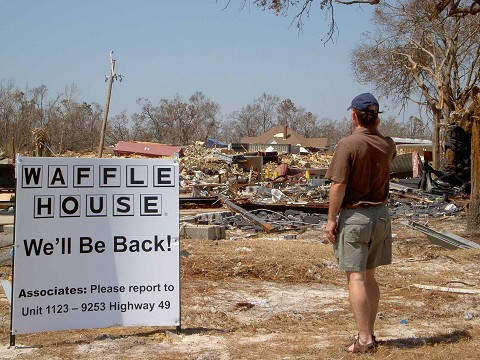The top two tasks of a leader

In this summer season of mission projects, a lot of people are being thrust into high pressure leadership situations in strange environments with people they don’t know. What an opportunity to grow their leadership skills! I just conducted a debrief with our New Orleans leader,
 Athol Barnes. We have a team of about 25 leaders there to facilitate ministry for approximately 3000 people. Many of them are young and learning leadership principles for the first time.
Athol Barnes. We have a team of about 25 leaders there to facilitate ministry for approximately 3000 people. Many of them are young and learning leadership principles for the first time.
There is so much good advice out there – how do you distill it all down to the basics, to blocking and tackling? After studying leadership for years, here’s my best shot:
The first task of a leader is not to actually lead anyone else but to lead themselves. You can begin leading yourself by getting a clear understanding of your strengths and taking roles that play to those strengths. For example, answer this question: According to people I trust, what are my top three gifts? Then ask: What percentage of my time do I spend using those strengths? To lead yourself, develop a plan to increase that percentage of time.
The second task of a leader is to define reality. Most leaders have a skewed view of reality. Just look at all the bad political leaders. Look at the pastors who aren’t leading. They don’t understand where the guy in the pew is coming from. They spend too much time in their study and not enough time asking questions. They don’t understand reality.
What helps leaders define reality better than anything is feedback. Other people’s perspectives are gold and should be solicited and valued. When someone criticizes you, the only appropriate response is, “Thank you very much for your assessment.” Anybody taking the risk of giving you feedback needs to be appreciated. Defensiveness just shuts you off from the outside perspective that you need. If you know someone in your group who is defensive, you know someone who has isolated themselves.
To work on your leadership, begin by asking someone whom you respect, “What do other people think of the way I lead?” Get feedback like this and appreciate it for the gift that it is. It helps you perform the two most important tasks of a leader: defining reality and leading yoursel by focusing on your strengths.
Comment
Leave a Reply Cancel reply
More Posts
![]()



Seth, Thanks for this post. I know I, as well as many other people, appreciate your wisdom and years of experience.
I just bought a whole mess of “Now, Discover Your Strengths” books for my summer leaders to hopefully help them identify and then focus on their strengths. I’m excited to see how it works out for some of them.
Great advice, thanks!